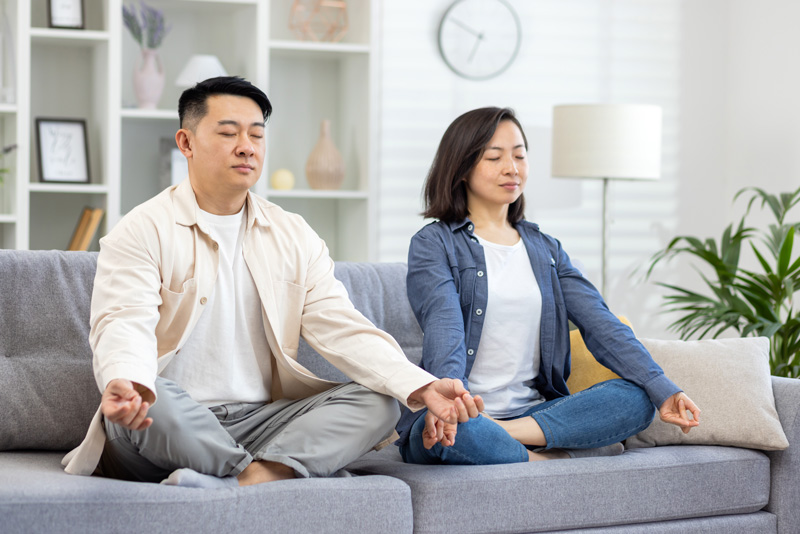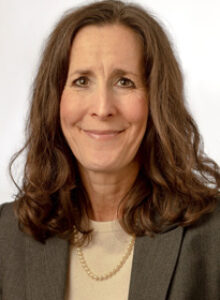Founded in 1978, Services for the UnderServed (S:US) works with over 37,000 individuals and families throughout New York City to create pathways to rich and productive lives by offering housing, employment, skills-building, treatment, and recovery services.1 S:US provides support in the areas of homeless services, supportive housing, behavioral health services, veterans services, community food security, and developmental disabilities services for people living with intellectual/developmental disabilities (I/DD). Our aim is to foster the health and well-being of the people we serve along with our staff. We support vulnerable populations because we understand that there are inherent challenges in life. Sessions for mindfulness and meditation practices grew out of this desire to address and strengthen the whole person – the people we support and our staff of 1,800.

The goals in providing these mindfulness and meditative sessions are to reduce stress and promote well-being. From the article The role of a mindful movement-based program (Movimento Biologico) in health promotion: results of a pre-post intervention study, the authors stated, “The World Health Organization (WHO) recognizes the essential role of psychological well-being and mental health promotion, describing it as ‘a key function for ensuring healthy lives and promoting well-being at all ages.’”2 The purpose in sharing these practices with staff and people supported is to promote a greater sense of well-being – both physically and mentally. In addition, I lead a weekly mindful breathing call for our staff to offer a pause in the work week, help staff decompress briefly, and foster a sense of presence and centering during the busy workday.
Inspiration for these mindful movement sessions grew out of the COVID-19 pandemic. Per New York State mandates, S:US shut down our day habilitation programs on March 17, 2020. As a result, S:US’ day habilitation programs pivoted to providing community habilitation to people supported in their homes. In 2021, S:US was allowed to open the day habilitation programs with a significantly reduced capacity, then was progressively allowed to open with increased enrollment as dictated by the state. By early 2023, New York State allowed day habilitation programs to open with full capacity. Previously these sessions were provided at staff meetings and retreats to reduce stress for various teams throughout the organization and were well received. During the pandemic, most of the day hab participants were staying at home in their Individualized Residential Alternatives (IRAs) or at home with family, receiving support from community habilitation specialists.
I led mindful movement and meditation sessions in backyards or inside homes, dependent on the weather, for people supported along with staff to provide additional enrichment, healthy ways to move, and reduce stress. Since many of our staff who participated in these sessions liked them, it was a natural fit to implement for program participants in their homes. I coordinated with day hab program directors to continue to offer these sessions onsite at programs once S:US was allowed to re-open at full capacity.
Mindfulness is the art of directing one’s attention with purpose to present-moment experiences – with an absence of judgment, with an openness to curiosity, acceptance, and non-reactivity.3 With an emphasis on moving mindfully, simple stretching and stress management exercises are woven into each session to help ease any tension or tightness that has built up from daily life. Some of the benefits that these sessions provide include releasing tension, strengthening and toning muscles, improving posture, increasing capacity to move with ease, greater dexterity and flexibility, cultivating calmness and relaxation, building connection to others, deepening one’s breath, increasing clarity, focus, and concentration; boosting responsiveness and decreasing reactivity; lowering stress and anxiety; and fostering empathy, self-compassion, and attunement. The practices are performed together as a group, and modifications are made for people who need them. The sessions run for 20-45 minutes, either inside programs or outside in warmer weather.
These sessions are beneficial because they help to nurture ease within one’s body and relieve stress for active participants. Dr. Jennifer Cohen, a professor at Miami University, has studied the stressors, including housing and food insecurity, that Direct Support Professionals (DSPs), the direct care workers that provide care for people with I/DD at day habs and IRAs. She reports that “The widespread…(food and household)…insecurity…is an occupational hazard that reduces worker welfare.”4 Further, Dr. Cohen and her colleague Yana van der Meulen Rodgers, explains “…without a workforce, there is nothing to deliver. The sector fundamentally relies on the workforce and its well-being for the delivery of services…worker well-being should be a key focus for employers and that well-being encompasses both paid work and life outside of paid work. Where latitude for raising pay is constrained…(due to lack of funding)…employers should find alternative ways of expressing the value of DSPs.”4 The addition of these sessions during the workday promotes well-being, reduces stress and tension, and increases relaxation for staff and the people they support as well as adds value because the practices teach new ways to handle stressors.
The writer Eline Snel shares, “Stress and tension are temporary but unavoidable. You cannot control the situations that give rise to them, but you can control the way you respond to them.”5 The focus of these sessions is to teach accessible practices and tools that one can use in one’s own life to embody a greater sense of ease and well-being. Valerie, a day hab participant shares, “…it makes me feel good, makes me feel relaxed…helps me sleep. I do the exercises at home sometimes in the morning or on weekends. It makes me feel better, helps my legs since I have arthritis in my legs.” Danny, another participant said, “…it calms my mind.” Yvette, their Program Director, explains “…it helps to alleviate some of the stress, to feel more relaxed, and it teaches techniques to relieve stress, fatigue or feeling overwhelmed in one’s own life. I notice that the group feels calmer after a session.” Andrea, a DSP remarks, “…I need it for the job. It stretches me out and helps strengthen my arms and legs. It helps me to relax, feel more composed and patient in the job with our participants. I feel looser, my body feels great, and I really enjoy the sessions.” Staff throughout S:US have shared that they feel more peaceful, calm, relaxed, and more awake and focused, along with feeling connected to colleagues after participating in one of these sessions.
S:US nurtures the well-being and resilience within our community and helps all of us to maximize the health benefits that mindfulness generates in easing and relieving stress. I am grateful for each participant who remains open to learning new practices to move and breathe with a mindful presence and learn tools to utilize in their own life to increase their well-being.
Lori Lerner, LMSW, RYT-200 hr, is Coordinator of Family and Wellness at Services for the UnderServed (S:US).
References
“Breathe Through This: mindfulness for parents of teenagers” by Eline Snel, Shambhala Publications, Boston, 2015.
“The role of a mindful movement-based program (Movimento Biologico) in health promotion: results of a pre-post intervention study” by Stefano Spaccapanico Proietti, Manuela Chiavarini, Francesco Iorio, Livia Buratta, Giancarlo Pocetta, Roberta Carestia, Camilla Gobbetti, Chiara Lupi, Antonio Cosenza, Guglielmo Sorci, Claudia Mazzeschi, Andrea Biscarini and Chiara de Waure. Frontiers in Public Health, 2024, June 11, Vol 12, 1-10.
Kabat-Zinn, J. Full catastrophe living: Using the wisdom of your body and mind to face stress, pain, and illness. New York, NY: Delacorte; (1990).
Prevalence of food and housing insecurity among direct support professionals in New York by Jennifer Cohen and Yana van der Meulen Rodgers, Disability and Health Journal, 2024, December 12, https://doi.org /10.1016/j.dhjo.2024.101769.
Services for the UnderServed. About Us Page. https://sus.org/about-us/.







